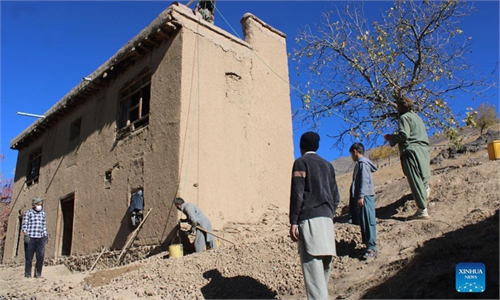
Afghan people stand along the roadside as they wait for taxi in Kabul on August 15, 2021. Photo: VCG
After the sensational talk about China filling the "vacuum" left by the US withdrawal from Afghanistan, some US media outlets have begun whining about the potential economic cooperation between Kabul and Beijing. But China's Afghan policy will only be carried out in accordance with its overall foreign policies and national interests with no regard for US badmouthing and criticism.The Voice of America, citing Husain Haqqani, director for South and Central Asia at Washington-based think tank the Hudson Institute, said that the prospect of China to invest billions in Afghanistan is just "wishful thinking," because an investment of billions of dollars means an expectation of hundreds of millions of dollars in annual returns, and right now the Afghan economy, ravaged by war, simply does not present that opportunity.
The report came in response to the Taliban spokesperson Zabihullah Mujahid's remarks saying that his government is ready to ensure the safety of Chinese workers and assets in return for billions of dollars of Chinese investment.
US media outlets have paid close attention to possible Chinese investment in Afghanistan, underscoring their complex mentality toward that country. The US has suffered great military and political failure in Afghanistan, and the deep sense of "humiliation" will make it hard for the US to ease economic and financial stranglehold over the Taliban. Meanwhile, it is not their wish to see China extend regional influence by investing in Afghanistan.
Yet, it is not the Taliban's "wishful thinking" at all when it comes to Chinese investment in Afghanistan's infrastructure and resources mining, because the two sides share a genuine willingness to cooperate to improve the well-being of Afghan people, even though there are still some areas which require further discussion.
In fact, when attending the First Foreign Ministers' Meeting on the Afghan Issue Among the Neighboring Countries of Afghanistan in early September, State Councilor and Foreign Minister Wang Yi made it clear that when security and other conditions are available, China is willing to help Afghanistan with projects that will contribute to improving livelihoods, support peace, reconstruction and economic development of the war-torn nation.
The reconstruction of Afghanistan will be a long process, focusing on the rebuilding of its economic and financial system, infrastructure and social order. The Taliban has expressed high hopes for Chinese investment to help improve infrastructure, and provide urgently needed jobs for the local people.
For China's part, Afghanistan still has strong development potential and is worthy of investment despite its decades of political turmoil. The country is rich in mineral resources like copper, gold, lithium and rare earths, and it has other natural reserves like oil, natural gas, coal and iron ore.
Moreover, if Afghanistan can rely on minerals mining to overcome its fiscal challenges and get the country's peaceful reconstruction back on track, it will be conducive to the regional stability and serve the interests of China and all its neighboring countries.
Whether Chinese enterprises invest in Afghanistan will largely depend on whether the Taliban can effectively ensure the safety of domestic production and construction, maintain social order, provide security and fight terrorism to win back investors' confidence.



